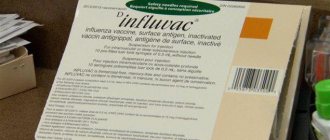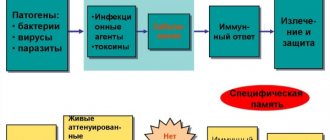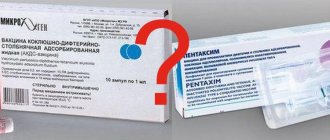Influenza is a contagious, rapidly spreading infectious disease. Often leads to complications as a result of modification of the virus. Taking into account this feature of the pathogen, new types of vaccines are developed every year. The most effective are Sovigripp and Grippol plus. Let's look at their differences, and which is better to use for adults and children as flu prevention.
What is the difference between Sovigrippa and Grippol plus
Sovigripp is a domestic pharmaceutical product to combat viral infection. Applicable since 2013. The drug contains influenza strains of medium activity. Every year, the vaccine undergoes variability as a result of the antigenic mutation of the pathogen, which makes it possible to increase its effectiveness in eliminating pathogenic flora.
The active and auxiliary components are:
- Hemagglutinin of different types of virus.
- Thiomersal in combination with the mercury emblem.
- Sovidon.
- A buffer mixture containing sodium and potassium hydrogen phosphates, potassium dihydrogen phosphate and clean water.
The pharmacological agent is intended for parenteral administration into the muscle. This is the buttock, thigh or shoulder area.
Grippol Plus is a Russian liquid vaccine in the form of an injection solution. Refers to third generation vaccination drugs. Therefore, the active component of the product is the virus antigens, neutralized by chemical means. They rarely cause allergy symptoms.
The vaccine contains glycoproteins from several strains of influenza A and B types. Excipients are azoximer bromide and a phosphate-salt mixture. The vaccine is used for subcutaneous and intramuscular administration.
As for preservatives, they are used when dispensing large vials of the drug, which helps eliminate microbial contamination. Thus, Sovigrippa uses thiomersal with ethyl mercury, and the Grippol plus vaccine contains no chemical additives at all.
Despite active preventive measures, influenza epidemics are recorded throughout the globe every year. This disease is known for its severe course. Antiviral drugs exist to combat influenza, but despite this, the disease often causes complications. The mortality rate from this disease is 0.01–0.2%.
Severe complications include the addition of a secondary infection, the development of pneumonia, otitis media, and meningitis.
In 2013, the domestic pharmaceutical industry released a new vaccine against influenza, which can compete with foreign analogues - Sovigripp.
This vaccine has been recognized by WHO and is actively used for immunization of the population in clinics. The Sovigripp vaccine is included in the Russian vaccination calendar and is free for patients.
How does this vaccine differ from its predecessors? Has it been clinically tested, what is its effectiveness and safety?
What kind of vaccine is Sovigripp?
"Sovigrip" - what is it? This is another domestic influenza vaccine, released in 2013. is Russian.
The drug is entirely produced at a domestic enterprise; components are not purchased from abroad. Since the Sovigripp vaccine is included in the vaccination calendar, since 2015 it has been given to everyone free of charge.
The Sovigripp vaccine contains components of the surface shell of influenza viruses of various strains. Each year, the vaccine has a different composition depending on the types of flu predicted for that season.
Influenza A and B viruses are the most common. But they constantly mutate, so the composition of the vaccine must also change in order for it to remain effective.
The Sovigripp flu shot differs from its analogues in that it uses Sovidon as an adjuvant (additive to enhance the immune response), and not Polyoxidonium, as in other vaccines.
The polymeric nature of Sovidon provides its main beneficial qualities:
— neutralization of toxins; — formation of immunity; — antioxidant properties; - protection of cell membranes.
Depending on the form of release of the Sovigripp vaccine, it may also contain thiomersal. This is a compound containing ethyl mercury. It is used as a preservative in multi-dose vials. Such bottles are intended for repeated use, therefore, to avoid bacterial or fungal contamination, this preservative is used.
The regular Sovigripp vaccine, which consists of one dose, does not contain this preservative.
Description of instructions for use "Sovigripp"
Who is the Sovigripp flu vaccine indicated for? Vaccination is recommended for all persons over 18 years of age for seasonal flu prevention. But in particular it needs to be done:
- elderly people (over 60 years old); — people who often suffer from acute respiratory infections; - persons with chronic diseases such as diabetes, heart disease, kidney disease; - people with immunodeficiency; - students; - doctors and other health workers; - social workers; - police officers and military personnel.
Where and how to get the Sovigripp vaccine
The vaccine is not intended for immunization of children. The instructions for the Sovigripp vaccine say that it can only be given to people over 18 years of age.
It is better to get vaccinated at the beginning of autumn, so that immunity has time to form for the seasonal epidemic. The immune response to the vaccine reaches its maximum on day 14. Protection lasts for 7–9 months. If cases of influenza have already appeared, it is still worth getting vaccinated.
The effectiveness of the influenza vaccine is 75–90%.
How is Sovigripp injected? The vaccine is given once a year. A single dose of Sovigripp is 0.5 ml. The graft is given intramuscularly into the upper third of the shoulder.
Before vaccination, it is advisable to avoid contact with people with acute respiratory infections and not to become overcooled. After vaccination, the same rules apply. You can get the vaccine wet. After the injection, it is advisable not to leave the clinic premises for half an hour. If life-threatening complications occur, help must be provided quickly.
It is not recommended to combine Sovigrip and alcohol. Alcoholic drinks reduce the production of immune antibodies, weaken the body's defenses and can lead to colds after vaccination. It is advisable to abstain from alcohol for at least 3 days after the injection. Contraindications
Sovigripp has contraindications . This vaccine cannot be given if:
— you are allergic to chicken egg white or other components of the vaccine; - with the previous administration of any influenza vaccine, serious complications were observed (very high temperature - more than 40 ° C, - - convulsions, loss of consciousness or collapse, severe local reaction in the form of edema more than 8 cm); - a person is sick with acute respiratory infections or other diseases accompanied by a rise in temperature; — the patient has a chronic disease in the acute phase.
Possible complications
In practice, serious complications from the Sovigripp vaccine have never been reported. She conducted clinical studies of the drug herself, together with the Influenza Research Institute and the Russian Ministry of Health.
Low-grade fever occurred in 0.9% of cases. In 1% of cases, pain and redness occurred at the injection site. These reactions lasted an average of 2 days and disappeared on their own without treatment. No other complications were recorded. But the instructions for Sovigripp also indicate the following adverse reactions:
- headache; - sore throat, runny nose; - very rarely, anaphylaxis, rash, urticaria, and possibly the appearance of Quincke's edema may occur.
Such cases have not yet been registered, but you should be aware of them.
"Sovigripp" during pregnancy can be used only in the second and third trimester and only with great benefit to the mother. The vaccination does not have a harmful effect on the fetus.
Pregnant women are at particular risk for influenza. Research is currently underway on the use of the Sovigripp vaccine in pregnant women and children. In the future, the indications for this vaccine will be expanded.
Additional information about Sovigripp
This flu vaccine can be used in people who are infected with HIV. It can be done together with other vaccinations, but in different parts of the body. The only vaccine with which Sovigripp cannot be given on the same day is tetanus.
If the vaccine is purchased in advance, it must be stored properly to maintain effectiveness. The drug is stored at a temperature of 2 to 8 °C and transported under the same conditions. It is better to use the vaccine that is available at the clinic. The likelihood that the vaccine is stored there under proper conditions is higher.
Similar vaccines to Sovigripp
Analogues of the domestic drug "Sovigripp" are:
"Agrippal" (Germany); Begrivak (Germany); Vaxigrip (France); "Grippovac" (Russia); AGH vaccine (Russia); "Grifor" (Russia); Inflexal V (Switzerland); Influvac (Netherlands); "Microflu" (Russia); "Ultrix" (Russia); "Fluarix" (Germany).
General conclusion
Let's summarize all of the above. The goal of vaccination is to create protection against influenza by introducing particles of viral cells. In addition to viral particles, influenza vaccines add adjuvants - substances that prolong immunity.
All vaccinations use Polyoxidonium for these purposes, but the Sovigripp vaccine uses the Sovidon adjuvant for the first time. It has immunomodulatory, as well as membrane-stabilizing and antioxidant effects, which is why the effect of vaccination increases and the number of cases of acute respiratory infections decreases.
The Sovigripp vaccination is effective in 80–90% of cases. Immunity is formed by day 14 and lasts 7–9 months. It is advisable to vaccinate in the fall, but it can also be done during an epidemic. Those at risk for influenza should be vaccinated first.
Sovigripp is given free of charge in clinics, as it is included in the vaccination calendar.
This vaccination is not indicated for children (Sovigripp without preservatives is used for children). Adverse reactions and complications with Sovigripp vaccination occur very rarely. Basically, this is an increase in temperature to low-grade levels and pain in the injection area. No cases of anaphylaxis, collapse, convulsions, or angioedema were recorded.
Each person makes the decision to get vaccinated against influenza independently. But vaccination significantly reduces the risk of disease and severe complications of this disease.
Source: https://privivku.ru
Go to the SOVIGRIPP website

Read also:
- How flu vaccines work
- New data on the evolution and spread of seasonal influenza viruses
- Flu vaccination in Clinical Hospital No. 1
- Ministry of Health of the Russian Federation. Memo for the public about influenza
- FLU: symptoms and prevention. Memo
- How to protect yourself from influenza A(H1N1)2009?
- No swimming or partying. What not to do after getting a flu shot
- A gift from Asia. What is the danger of the Hong Kong flu expected this winter?
- The Russian Ministry of Health has prepared recommendations for the prevention of influenza
- Swine flu
- FLU: Clinic, epidemiology, prevention, treatment
- Prevention of colds in hospital No. 1
- WHO. Exacerbation of respiratory diseases in spring
- Swine flu A(H1N1)
- Protect yourself! How to avoid getting sick in transport
- How to protect yourself from the flu in the fall?
- Flu. Memo for the population
- WHO. Immunization coverage. Newsletter N°378. September 2015
- We invite you to get vaccinated against influenza
- Flu vaccination. Questions and answers
- Carefully! Bird flu
- Myths and facts about the flu
- Flu symptoms and ARVI symptoms. What is the difference between influenza and ARVI?
- About complications of influenza. Why is it necessary to see a doctor?
- Flu vaccination: yes or no?
- Crimean hospitals will introduce additional measures to prevent the spread of influenza
- Flu and ARVI
- The Ministry of Health plans to vaccinate 40% of the Republic's population against influenza
- Vaccination is the most effective preventive measure, - Alexander Golenko
- The Ministry of Health plans to involve 40% of Crimeans in the flu vaccination campaign
Which vaccine is more effective against influenza?
The therapeutic effect of Grippol plus and Sovigrippa is no different.
According to the opinion of many doctors, most are inclined to choose Sovigrippa. This is due to the wide range of therapeutic effects and few side effects.
Laboratory studies confirm the full compliance of vaccines with medical requirements.
The therapeutic duration of the products does not differ. Antiviral activity is noted 2-3 days after vaccination. The protective properties of pharmaceuticals last up to 6-12 months.
Vaccination rules
The drugs Sovigripp and Grippol plus are used at the same time. Traditionally, vaccination is carried out in the off-season, when the risks of epidemic activity increase.
The drug is used for parenteral administration. The main injection sites are the muscles of the thigh, shoulder and, less commonly, the buttock.
The dosage depends on age:
- From 6 months to 3 years - 0.25 ml twice with a break of 4 weeks, if vaccination is carried out for the first time. Previously vaccinated children receive a single injection with a dosage of 0.5 ml.
- Children over 3 years old and adults - 0.5 ml 1 time.
- Persons with immunodeficiency - 0.5 ml 2 times with an interval of 4 weeks.
Safety and side effects
Sovigripp and Grippol plus are the most effective and safest drugs on the Russian market. This property of vaccines is explained by the reduction in the pathogenic effects of influenza viruses due to chemical agents.
But despite this, vaccines can cause the following side effects:
- Signs of an influenza infection include fever, cough, runny nose and malaise.
- Headache.
- Allergic manifestations in the form of itching, rash and hyperemia.
- Formation of a limited infiltrate in the injection area.
- Gastrointestinal disorders.
Severe side effects occur less often. These are erythema nodosum, neuralgia and paresthesia.
Immunization is highly not recommended in case of individual intolerance to chicken protein, severe disease conditions and the appearance of undesirable symptoms after the first vaccination.
How many days without washing?
As for the duration of refusal to bathe, if you have received a flu shot, you should not bathe for 2-3 days. If the need arises, you are allowed to take a shower, but the water must be warm, not hot, and you cannot use a washcloth.
If immunization is carried out subcutaneously with Sovigripp, there is a possibility of severe itching. But scratching the injection area is strictly prohibited.
What do you think are the most important factors when choosing a medical facility?
This can lead to tissue injury, and the unpleasant sensations will not disappear. In addition, this increases the risk of infection in the wound, which causes an inflammatory process to develop or swelling to appear. In such a situation, it is necessary to visit a doctor for examination, receive recommendations for treatment and determine the time frame when it will be possible to wet the injection site.
Which is better - Grippol plus or Sovigripp
There is no particular difference between the Grippol Plus and Sovigripp vaccines. Taking into account all the above information, we can conclude that pharmacological agents have a similar composition and side effects.
Both drugs are made in Russia, have a high degree of purification and fully comply with medical criteria.
The cost of a single dose of Sovigrippa is 200-250 rubles. The price of Grippol Plus is 2 times higher for a similar dosage and equals 430 rubles.
According to reviews, patients prefer the Sovigripp vaccine, noting its high effectiveness. Comparing the two drugs, Grippol plus is somewhat inferior to Sovigripp in quality and price.
Which vaccine is suitable for children?
Both one and the other vaccines are completely identical. Regular monitoring by Roszdravnadzor allows us to cast aside all doubts about their safety. Therefore, both products are ideal for immunizing children.
Every year, changes occur in the composition of medications, which improves their quality and effectiveness in preventing influenza.
Everyone needs to be vaccinated - children and adults. The drugs have no toxic effects, so immunization is not prohibited during pregnancy. It is impossible to fully judge the effectiveness of the vaccine. Experts recommend getting vaccinated every year to prevent infection and complications during a flu epidemic.
What happens if you get it wet?
After vaccination against influenza, there is a possibility of an increase in temperature, which is why doctors advise that you can wash yourself after a couple of days after vaccination.
But if you accidentally got your flu shot wet, you shouldn’t be afraid. If you have doubts about whether you can wash yourself with a flu shot or not, feel free to take a bath after immunization, but do not scrub the injection area with a washcloth and use only warm water.
There will be no harm when the hand in which the vaccine is administered to the child is accidentally wet, although the mother is warned that she should not wet the injection site. This does not always lead to the development of inflammation and pain.
What to do
If the area where the flu vaccine was administered was accidentally wet, there is no need to be afraid; it is worth observing the area. If redness, swelling, thickening, itching, or fever occur, you should visit a doctor as soon as possible. Important: in order to prevent the development of possible complications, you cannot mechanically influence the injection site.
Before immunization, patients ask whether it is possible to wash after a flu shot. There is no categorical prohibition; flu shots can be soaked. But the water should not be hot or too cold, and you cannot use a washcloth in this case, as this will injure the injection site. In addition, the child should not visit the bathhouse or sauna, so as not to provoke negative consequences.








